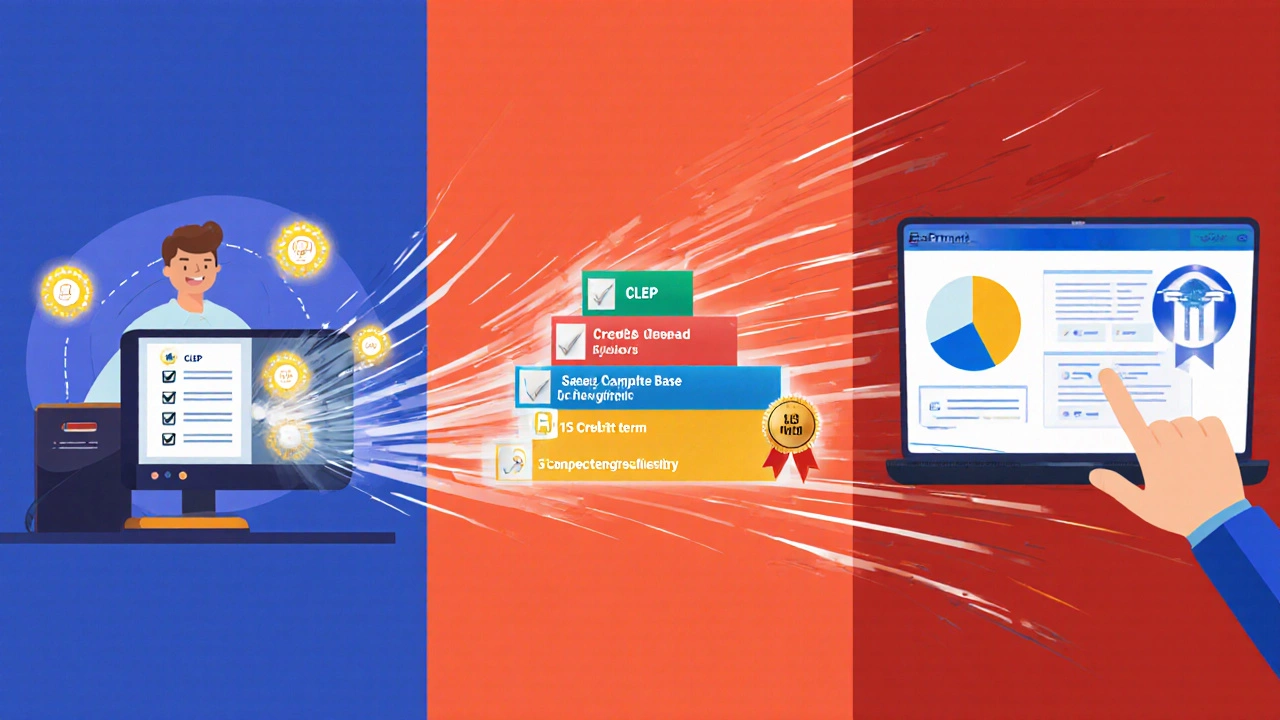
Fastest Online Degree: Quickest Programs and How to Finish Them
Online Degree Acceleration Calculator
Calculate Your Accelerated Degree Timeline
Your Estimated Timeline
Enter your information above to see your estimated completion time.
When people ask about the online degree is a credential earned through fully digital coursework, often from accredited colleges that let you study from anywhere, they usually care about speed as much as the credential itself.
Key Takeaways
- Associate degrees can be finished in 6‑12 months with accelerated schedules.
- Some bachelor’s programs offer 18‑month completions through credit‑by‑exam and competency‑based models.
- Master’s degrees, especially MBAs, can be earned in as little as 12 months if you already have a bachelor’s and take intensive terms.
- Accreditation, credit transfer policies, and exam options (CLEP, DSST) are the biggest speed drivers.
- Choosing a provider with a proven competency‑based framework can shave months off any program.
What Makes a Degree "Fast"?
Speed isn’t just about fewer semesters; it’s about how many credits you can earn per term and how quickly you can prove mastery. Accelerated degree programs compress traditional semester pacing by offering multiple start dates, shorter terms, and higher credit loads. Add to that competency‑based education, where you advance as soon as you demonstrate skill, and you have a recipe for rapid graduation.
Degree Types You Can Complete Quickly
- Associate Degree - Typically 60 credits. Schools that allow 15‑credit terms and accept credit‑by‑exam can reduce this to 6‑9 months.
- Bachelor’s Degree - 120 credits. Accelerated pathways, stackable certificates, and prior‑learning assessments can cut the timeline to 18‑24 months.
- Master’s Degree - 30‑60 credits. Many MBAs and specialized masters offer 12‑month tracks for students who can handle a full‑time, intensive load.

How Accelerated Programs Work
Three main mechanisms drive speed:
- Credit Overload - Enrolling in more than the standard 12‑15 credits per term.
- Prior‑Learning Assessment - Exams such as CLEP College Level Examination Program, letting you earn college credit for knowledge you already have or DSST can replace whole courses.
- Competency‑Based Education (CBE) - Schools like Western Governors University let you move through modules at your own pace, often finishing a 3‑credit course in weeks instead of months.
Top Providers for the Fastest Online Degrees
| Provider | Fastest Program | Typical Length | Average Tuition (USD) | Accreditation |
|---|---|---|---|---|
| University of Phoenix | Accelerated Associate in Business | 6‑9 months | $7,500 | Regionally accredited by HLC |
| Southern New Hampshire University | Fast‑Track BS in Management | 18 months | $15,800 | Regionally accredited by NEASC |
| Western Governors University | Competency‑Based BS in IT | 12‑18 months | $13,500 | Regionally accredited by NWCCU |
| Colorado State University Global | Accelerated MBA | 12 months | $22,000 | Regionally accredited by HLC |
| Arizona State University Online | Full‑Time BS in Computer Science | 20 months | $18,900 | Regionally accredited by HLC |
Critical Factors to Evaluate Before Enrolling
Speed can be a double‑edged sword if you overlook these checkpoints:
- Accreditation - Ensure the school holds regional accreditation; it affects transferability and employer recognition.
- Credit Transfer Policies - Some institutions let you import up to 90 credits, dramatically shortening your path.
- Exam Acceptance - Look for schools that recognize CLEP, DSST, or its own competency assessments.
- Support Services - Fast programs demand quick feedback; dedicated advisors and 24/7 tech help are essential.
- Cost vs. Speed - Intensive programs may cost more per credit; calculate total expense, not just monthly tuition.

Step‑by‑Step Guide to Earn Your fastest online degree
- Identify your career goal and the credential that aligns (associate, bachelor’s, master’s).
- Choose a provider from the table above that offers an accelerated track in that field.
- Check the school’s accreditation and credit‑transfer rules; request a prior‑learning evaluation.
- Enroll in credit‑by‑exam options (CLEP, DSST) for any subjects you’ve already mastered.
- Schedule a full course load each term (15‑18 credits) or opt for a competency‑based plan if you can study full‑time.
- Set weekly milestones; use a planner to track assignments, exams, and credit‑by‑exam deadlines.
- Maintain regular contact with an academic advisor to verify you’re meeting graduation requirements.
- Complete any required capstone or practicum early by choosing a project that can be submitted online.
- Apply for graduation as soon as you hit the required credit total; many schools process this within two weeks.
Common Pitfalls and Pro Tips
Pitfall: Overloading without a solid study routine can lead to burnout.
Tip: Treat each term like a full‑time job-dedicate specific hours daily and use a Pomodoro timer to stay focused.
Pitfall: Ignoring accreditation can invalidate your credential.
Tip: Verify the school’s accreditation on the U.S. Department of Education’s Database of Accredited Postsecondary Institutions.
Pitfall: Not accounting for exam fees.
Tip: Factor CLEP or DSST costs ($80‑$120 per exam) into your budget early.
Frequently Asked Questions
Can I finish a bachelor's degree in less than two years online?
Yes, if you combine credit overload, prior‑learning exams, and an accelerated schedule. Schools like Southern New Hampshire University and Western Governors University regularly report 18‑month completions for motivated students.
Are accelerated online degrees as reputable as traditional ones?
Reputation hinges on accreditation and employer perception, not speed. As long as the program is regionally accredited, employers treat it the same as a traditional degree.
What exams can I use to earn credit quickly?
The most common are CLEP (College Level Examination Program) and DSST (formerly DANTES Subject Tests). Both are accepted by many accredited colleges and can replace entire courses.
Do competency‑based programs require a set schedule?
No. You progress as soon as you prove mastery. However, most schools impose a maximum time limit (often 12‑24 months) to keep students on track.
How much does a fast‑track online degree typically cost?
Costs vary widely. Associate degrees can be under $8,000 total, while accelerated bachelor's programs range from $12,000 to $20,000. Adding CLEP exam fees (usually $80‑$120 each) is a modest extra expense.
By picking the right provider, leveraging credit‑by‑exam options, and staying disciplined, you can earn a credible credential in a fraction of the traditional time. The key is to balance speed with quality-nothing beats an accredited degree, even when you finish it fast.






Write a comment